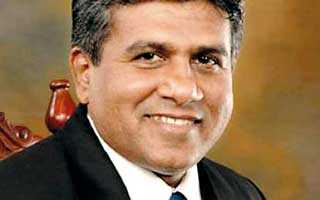Thursday Feb 26, 2026
Thursday Feb 26, 2026
Tuesday, 7 January 2020 01:19 - - {{hitsCtrl.values.hits}}
Chairmen, directors and staff officers of companies in which State has 25% of share capital are to be brought under provisions of proposed law
Present law applies only in cases where Govt. holds majority of shares
New categories to be brought in by amendment include TU executives and newspaper proprietors
HCS, ambassadors and consuls serving overseas also to be included
By Chandani Kirinde
Under an amendment proposed to the Declaration of Assets and Liabilities Law, No. 1 of 1975, chairmen, directors and staff officers of companies registered under the Companies Act, in which the State, a public corporation or board holds not less than 25% of share capital are to be brought under the provisions of the Act.
At present, the law only applies to chairmen, directors and staff officers at companies where the majority of shares are held by the State or by a public corporation.
 |
| MP Wijeyadasa Rajapakshe |
The proposed amendment also includes new categories to which the provisions of the Act will apply, including executives of trade unions registered under the Trade Unions Ordinance and proprietors, editors and members of the editorial staff of newspapers who ought to make declarations under Section 2 of the Newspapers Ordinance.
High commissioners, ambassadors and consuls employed at Sri Lankan missions overseas are also to be included in the proposed amendment. This and several other amendments have been included in a Private Member’s Bill which is to be presented to Parliament by Wijeyadasa Rajapakshe. The Bill has been published in the Government Gazette.
Rajapakshe told the Daily FT that he has proposed several Private Member’s Bills including this one which he plans to present to Parliament in the coming weeks. These include the 22nd Amendment to the Constitution which seeks to bring the Defence Ministry under the purview of the President. Another Private Member’s Bill that is to be moved by Rajapakshe seeks to make it mandatory for political parties to get over 12.5% of votes from an electoral district at a General Election in order to secure its respective parliamentary seat. At present, a political party can secure a seat by getting 5% of valid votes cast in a particular district.